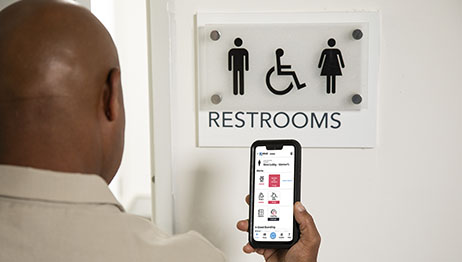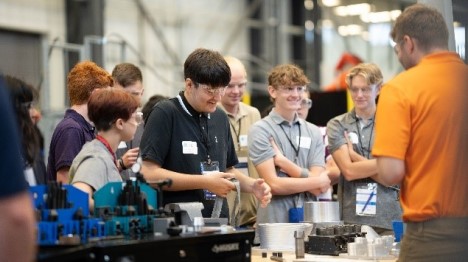Industry 4.0 is revolutionizing metalworking and manufacturing operations—cloud computing enables remote production management, digital twin technology creates virtual models of parts and processes, and remote sensors generate real-time equipment data for precision decision-making.
As employers look to leverage connected solutions to better their business, there is one more innovation to consider: the smart restroom.
In a smart restroom, internet-connected dispensers—for tissues, towels, soaps and sanitizers—collect and transmit data via a secure network to the cloud, where it is processed and delivered to apps and dashboards. Cleaning teams use the information to know which restrooms need service and when, ultimately helping the business save labor costs and product waste.
“Without a smart restroom system, you have this paradigm—you either have high waste in your dispensers and low outages, or you have high outages and low waste. So you’re always sacrificing one thing in order to be successful at something else,” says Rex Moon, senior director of sales for the connected solutions business at GP PRO, a division of Georgia-Pacific.
“With an alert system, we can reduce unnecessary dispenser checks and restroom checks by 95 percent. The idea here is that you reallocate your labor to more valuable tasks.”
Rex Moon,
Georgia-Pacific
The company’s KOLO® smart monitoring system helps cleaning teams achieve that balance.
“This system was designed to take some of the labor out, but also to make sure that you’re not having outages, and you’re also using all of your product, i.e., you’re replacing the product at the time of need,” Moon says.
Read more: How Better Hand Cleaning Helps Create a Safer, More Productive Workplace
Key Benefits of a Smart Restroom
Of the companies that have installed KOLO, 92 percent report being satisfied1, and “everyone seems to renew noting that going back to the old ways is not an option,” Moon says. For one big automotive assembly plant, Georgia-Pacific expects a full return on investment within the first 10 months of a 36-month term2.
After collecting data from 30 active sites3, Georgia-Pacific has surfaced four key benefits that employers realize in the KOLO smart monitoring system.
Labor Optimization
Here’s an eye-opening insight from Georgia-Pacific’s proprietary research: Only 5 percent of the time when cleaners go into a restroom is there a need to fulfill3. KOLO removes the guesswork for cleaning teams.
KOLO monitors dispenser levels and overlays that information with product usage patterns in each restroom, and when something likely needs replenishing, it sends an alert to the responsible cleaner.
“With an alert system, we can reduce unnecessary dispenser checks and restroom checks by 95 percent3,4,” Moon says. “In a traditional stacked office building, that’s 29 hours of labor returned each week3,5. The idea here is that you reallocate your labor to more valuable tasks. In an industrial space, it may be dusting the manufacturing floor to prevent fire.”
Product Waste Savings
On regular rounds, a cleaner might see a small commercial roll of toilet paper in a stall or a low-level commercial bottle of soap by the sink and replace those items before they run out. “The issue in doing that is that they’re losing money because they’re not using all the product, but they’re also diverting it right to landfill,” Moon says.
“Typically in an industrial setting, 15 percent to 35 percent of the product that they buy they’re wasting because of premature replenishment,” he continues.
With KOLO’s app, individual cleaners are alerted when it’s time to replenish products. “This system can help enable 100 percent product utilization and nearly zero waste3,” Moon says. “We have some facilities that have gotten to zero waste.”
Enhanced Restroom Experience
Clean and well-stocked restrooms influence people’s perceptions of a business.
According to Georgia-Pacific research, 90 percent of manufacturing workers agree that clean restrooms and breakrooms are basic requirements of a place they would choose to work6, and 80 percent would prefer to work for a company that emphasizes cleanliness6.
KOLO empowers teams to be proactive in managing cleaning to boost employee and guest experience. “The system has proved to be able to keep dispensers full and functional 99.5 percent of the time7,” Moon says.
Enabled Cleaning Team
Employers using KOLO receive a dedicated customer success manager for the life of the term that includes support for cleaning teams.
“They pull customized data for the facility and the clean team management,” Moon says. “We can help them, through data, identify top performers within their workforce.”
Georgia-Pacific takes a celebratory approach that rewards teams when they realize benefits from the system, he says.
“We’ve presented certificates to individual cleaners with their names on it,” he explains. “We’ve actually had a couple of them break down in tears and say, ‘I’ve never been acknowledged for my work. This certificate I’m going to frame and put on my wall. It’s really meaningful.’”
Read more: How Georgia-Pacific Helps the Food Industry Curb Contamination Risk
One Connected Network with Room to Grow
A smart restroom system, like most technologies, must be reliable. “Any connected system needs a network to communicate the data, and the data ultimately needs to end up in a cloud so it can be accessed by the platforms to display that information,” Moon says.
To help ensure the reliability of its system, Georgia-Pacific uses a LoRaWAN® network from Comcast’s MachineQ, an Internet of Things (IoT) platform and solutions provider. “It’s a high-range, low-frequency network that scales in a facility really well and permeates concrete walls and steel structures far more than Wi-Fi would,” Moon says.
By setting up Georgia-Pacific’s smart restroom system through MachineQ’s scalable network, employers can avoid the dreaded “IT closet creep” and pave the way for streamlined connectivity in the future.
“One of the challenges in the IoT space is that in its infancy, you put a solution in, and each solution provider brings their own proprietary network,” Moon explains. “You start to have IT closets that have 13 or 14 gateways, each powering single devices. And you’re paying for each of those networks.”
MachineQ’s platform allows employers to leverage all types of Industry 4.0 devices, whether from their first-party offerings or their ecosystem of partners—such as vibration sensors, asset trackers and utility monitors—all on one network.
“You can amortize the cost of the network that’s built into KOLO by adding other solutions that create value in other ways,” Moon says.
Footnotes
GP PRO proprietary research among customers surveyed: NCT-P-25-1216
ROI Plan, KOLO Overview Presentation
NCT-22-NS KOLO Claims Support Documentation
Based on a building with 600 dispensers, 20 seconds per dispenser check twice daily
Assumes 5,580 dispensers at 20 seconds per dispenser check
GP PRO Proprietary Research: PRO-19-3874
Based on data from 4,579 connected towel, tissue and soap dispensers





